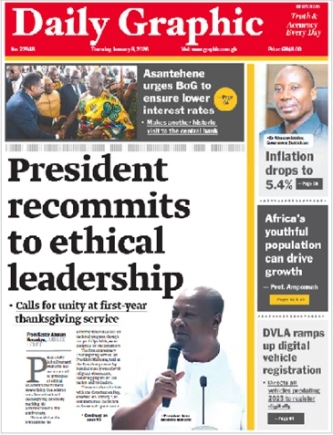The Affirmative Action Bill (1)
There is yet another attempt to pass an affirmative action bill.
The legislation, Affirmative Action (Gender Equality) Bill 2024 was presented to Parliament on June 14, 2024. In this piece, I reflect on a) Ghanaian dispositions on gender equality and b) the implications for the fate of the current bill in parliament.
Mapping the gender dispositions landscape
1. Equal rights for both genders. In Afrobarometer Round 2 (2002), Ghanaians were asked “Which of the following statements is closest to your view? Statement A: Women have always been subject to traditional laws and customs and should remain so. Statement B: In our country, women should have equal rights and receive the same treatment as men do.” In response, Ghanaians had this to say – 76 per cent agreed with Statement B while 20 per cent agreed with Statement A. Ghanaians reiterated their support for Statement B when the question was repeated in Round 3, 2005 (82 per cent) and Round 5, 2012 (84 per cent).
2. Election to political office. Ghanaians generally believe women should have the same chance of being elected to political office as men. On the choice between A: Women should have the same chance of being elected to political office as men; and B: Men make better political leaders than women and should be elected rather than women, the former has received strong support over the years – 84 per cent (2005); 72 per cent (2012); 70 per cent (2014); 73 per cent (2017), and 78 per cent (2022).
3. Equal rights to land. Access to land is a very prized asset in places such as Ghana because it is a source of wealth for families. In response to the statement “Women should have the same rights as men to own and inherit land,” a strong majority of Ghanaians agreed – 89 per cent (2017); and 85 per cent (2022) over the two rounds that the question was asked.
4. Equal opportunities for men and women. In Afrobarometer Round 7 (2017), Ghanaians were asked the extent to which women and men have equal opportunities. Across the three areas probed, Ghanaians agreed, in their numbers, that men and women have equal opportunity to – a) earn an income (92 per cent); b) get a job that pays a wage or salary (92 per cent); and c) own and inherit land (87 per cent). In Round 9 (2022) though, the percentage saying men and women have equal opportunity to get a job that pays a wage or salary dropped to 63 per cent while those saying same about owning and inheriting land dropped to 71 per cent.
5. Institutional treatment of women. In Afrobarometer Round 5 (2012), Ghanaians were asked whether there is unequal treatment of women by three institutional actors. In response, a) 37 per cent of Ghanaians said women are often or always treated unequally by traditional authorities; b) 31 per cent said same of the police and the courts; and c) 40 per cent also said same about employers.
Implications for the fate of the bill
Ghanaians a) have positive and strong normative beliefs about gender and women’s rights issues; b) strongly support equal rights or opportunities for women; c) believe that women and men enjoy certain equal opportunities. Yet there is a recognition of existing challenges when it comes to how women are treated by certain institutional actors.
It is therefore baffling that gender and women’s issues have not ranked very high on the policy priority list of Ghanaians. Across eight rounds of the Afrobarometer survey, far less than one per cent have ranked gender issues as a policy priority.
The National Commission for Civic Education’s Matters of Concern To The Ghanaian Voter survey, conducted during election years, recorded the following percentages who ranked women’s issues as a first priority – 2004 (8.5 per cent); 2008 (8.2 per cent); 2012 (9.2 per cent); 2016 (4.4 per cent); and 2020 (3.3 per cent). Notice the five-percentage point drop between 2004 and 2020.
This sets an intriguing stage for the anticipated debate and potential passage of this bill. Given the many unsuccessful attempts over more than ten years now, it is tempting to ask whether the prospects for passage are any brighter this year compared to the past.
In Afrobarometer Round 7 (2019), when asked if things are worse or better when it comes to Equal opportunities and treatment for women,” Ghanaians said this – 4 per cent (much worse); 7 per cent (worse); 44 per cent (same); 37 per cent (better); and eight per cent (much better). Perhaps this is a signal for why this bill is needed.
Keep in mind these three things. The bill seeks to – a) affirm our normative beliefs in gender equality; b) address incorrect assessments of our belief about gender practices and treatment of women; and c) narrow and close gender gaps in both public and private sector spaces.
In Part II, I will provide highlights of the bill’s strategies for achieving gender equality and the institutional arrangements for implementation if it becomes law.
The writer is Executive Director, Democracy Project

 Click the link to read your copy.
Click the link to read your copy.